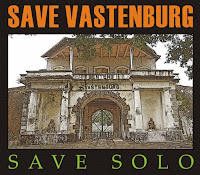 Marco Kusumawijaya
Marco Kusumawijaya
The rise of civil society is perhaps the best thing one can witness as a result of 1998 reform. It is often not noticed, that along the tragedy in 1998 riots, a strong solidarity among citizens also manifested itself. There is a factor of citizen activists, that have been growing in number but working clandestinely in two decades before 1998.
Picture is originally a design of T-Shirt to help promote saving Benteng Vastenburg in Solo of C. Java, taken from diligent photograher mas Blontank Poer's blog. We join you to promote your T-Shirt design to our readers. Please click this link: Save Vastenburg.
After 1998, we are also witnessing new “activists” organising themselves. They are the less heroic and less pretentious type of activists: a group of mothers, a new circle of young researchers, a group of alumni from the same university or of the same year, a new generation of artists. Nevertheless, they are no less “active” in changing our urban-scape, with actions or discourses.
Notably after 2001, after major medias started to report and give spaces to opinions on urban issues, there have been a wide-spread talks about urban issues among people and professionals of different background. Environmental disasters and new autonomy are a factor in intensifying popular experience of urbanity.
My personal journey as an “urbanist” includes a tour of meetings with groups of people with all kind of backgrounds. Last month, the Driyarkara school of Philosophy started a series of lectures for the public by their professors on the city. In arts, the CP Biennale 2005 is themed Urban Culture; and again Jakarta Biennale 2009 was just completed with overwhelming arts in public spaces where artists encourage interactions with and among the public.
It is arguably hopeful that this strong emergence of public discourse on urbanism will gain bigger momentum and be sustained over the next decade or so. It will sooner or later give rise to a new sense of urban citizenship. Can this energy forge sustainable change towards sustainability?
At least, three components can be proposed to facilitate that:
- a common knowledge base, perhaps in the form of an annual journal of the city, recording major events and ideas that are shaping the city,
- spaces to exchange ideas, actions, solutions, know-hows, alternatives as initiated among citizens and other agents (governments, etc.): regular, periodic citizens’ conferences, continuous exchanges in web-based space, etc.,
- opportunities to develop and to exhibit alternative visions, or visionary urban planning options on city’s spaces and issues in interactive public spaces.
However, not all the news are good news. Menteng, Jakarta’s examples (as well as in other cities such as the case with Solo’s Vastenberg) also show that public spaces are not given, but must be fought for. And, with the declining population in city center (in Jakarta, for sure), or even when upper class population is quickly replacing lower middle class in it, will there be sufficiently intense urbanity for urban citizens to pull together urban integration?
The skrinking intervention of the state, the expanding presumptuousness of the private sectors, and the invasive aggression of sectarianism, leave a precarious space for civil society. Continuous works and practices are inevitably a key to affirm the civil space.




















Untuk Hari Ini
Babu Negara
Olkes Dadilado
Education21
Rairo
Geworfenheit
Kodrat Bergerak
Chi Yin
aha!
John's blog
ambar
andreas harsono
bibip
Space & (Indonesian) Society
dreamy gamer
sundayz
wadehel
rudy rushady
Timor Merdeka
G M
Karena Setiap Kata adalah Doa
Sarapan Ekonomi
wisat
Adhi-RACA